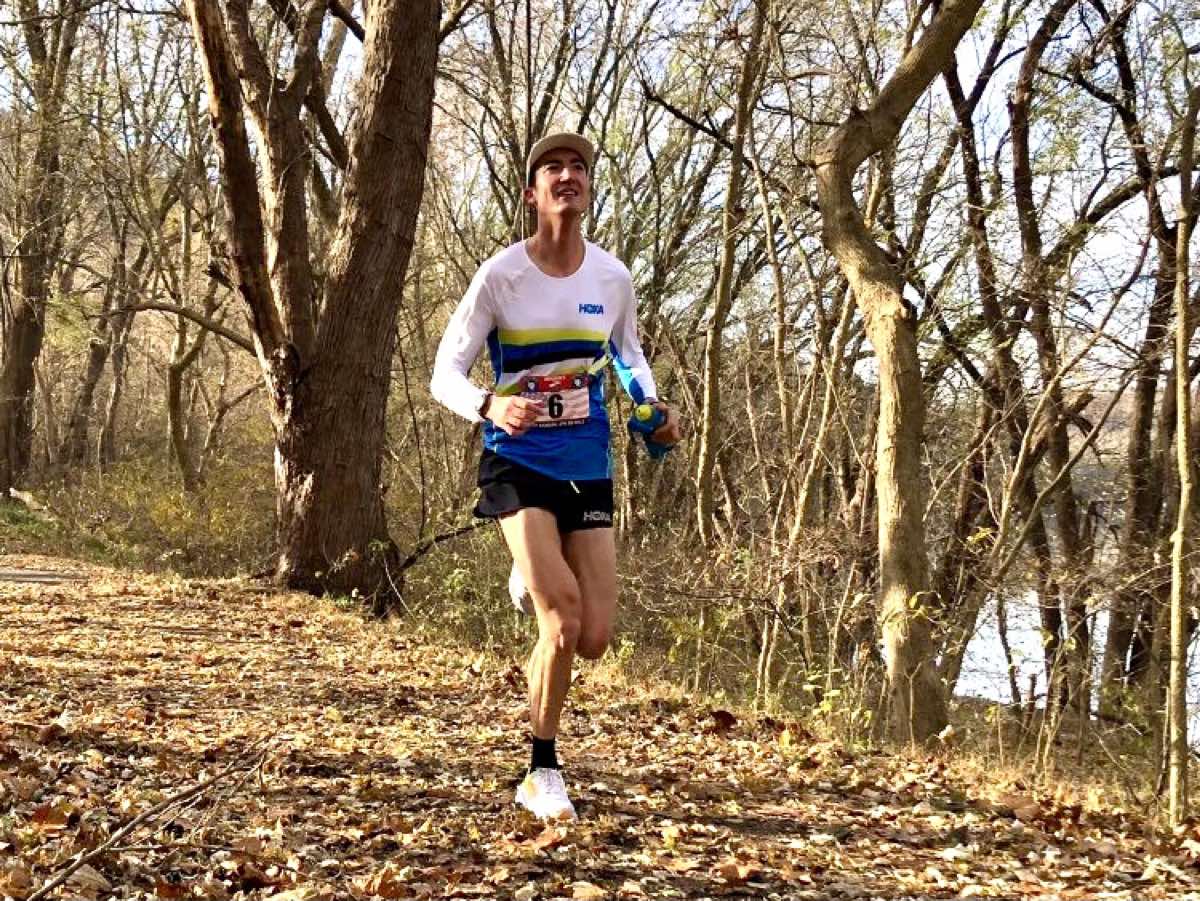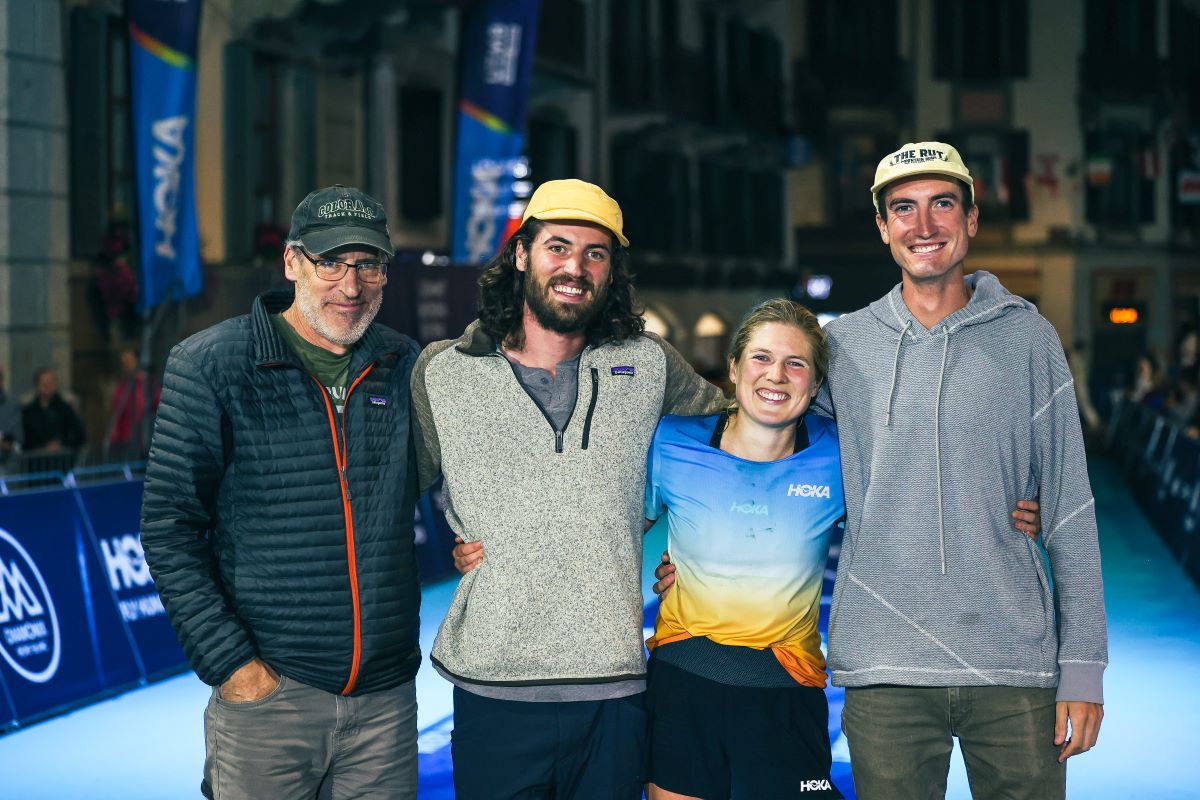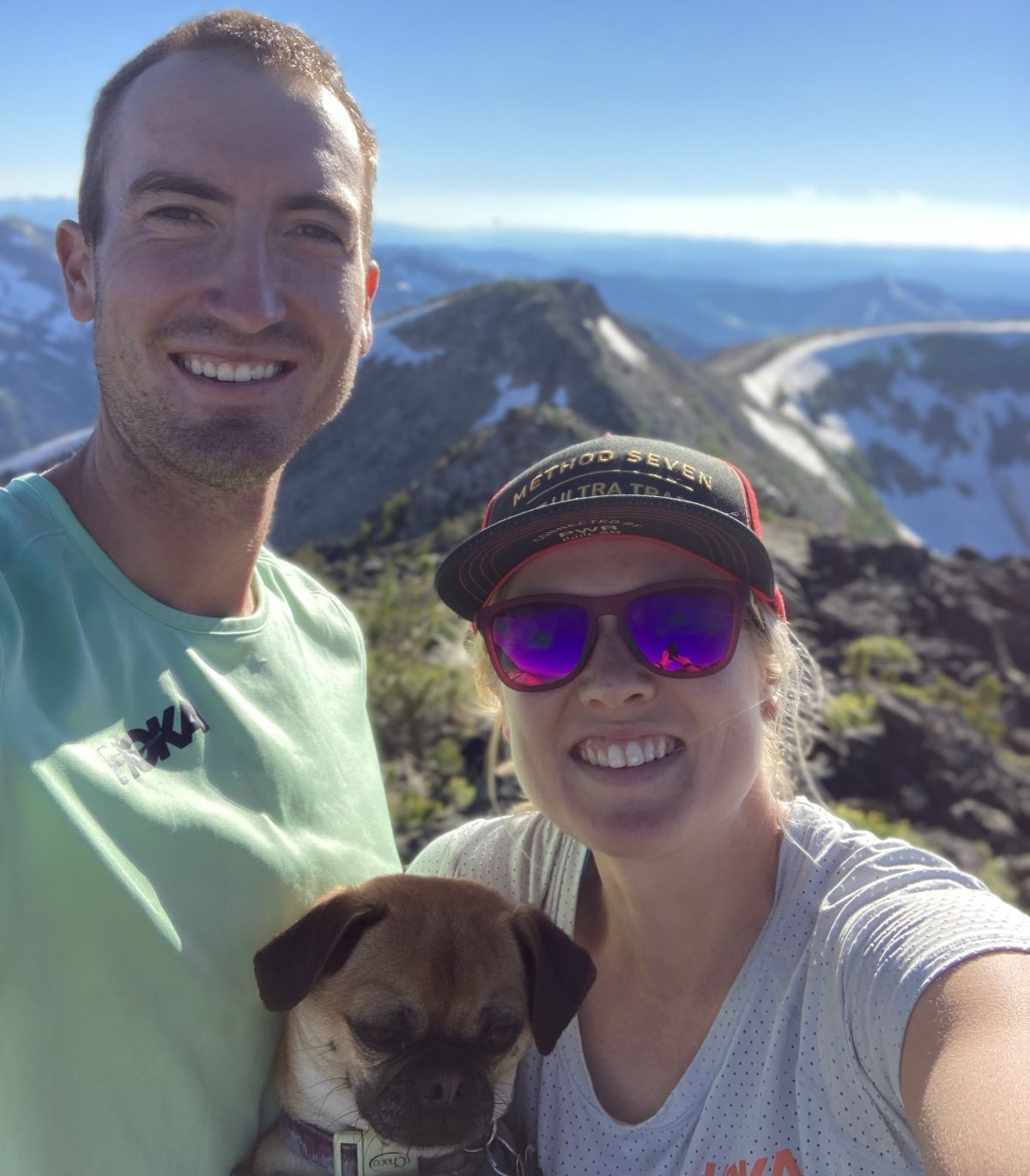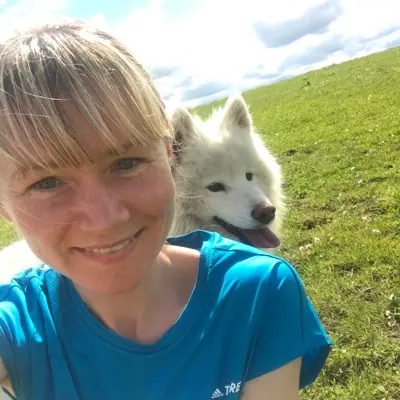International Trail Running Association (ITRA) Performance Index rankings place Adam Peterman, who is at the beginning of his trail running career, as the second fastest trail runner in the U.S. — behind only Jim Walmsley. And yet when I reached out to him for this interview, he thanked me with sincerity for taking the time to talk to him. This grounded and humble attitude is evident too in how he races.
With wins at the 2022 Canyons by UTMB 100k (post-race interview) and Western States 100 (post-race interview) — his first 100 miler — both executed in the same disciplined and carefully paced manner, there is no doubt that there is a lot more to come from the young Montana runner.
The Early Running Years
Adam Peterman began running in middle school, partaking in a cross-country program in his hometown of Missoula, Montana. He hadn’t had much luck at sports before he discovered running and said, “I played guitar and played in a band in my school, so I was more musically oriented … I was pretty small for my age and so any other sports I tried I was never very good at. I didn’t feel like I was very coordinated. I played a little soccer when I was younger, and I was just horrible at it. I would always get hit by the ball! But then when I started cross country, I was the best runner on the team right away and so it was nice to be successful at something.”
The high school in Missoula, which Peterman later attended, had a strong cross-country team and was a great place for him to progress in the sport. He said, “We were pretty competitive, one of the top teams in the state. I was hooked right away, and I always wanted to find a way to be better.” He continued to improve with age, saying: “I got a lot better by my senior year, I was kind of a late bloomer. I was ranked in the top 20 [in the nation] for my 3,200-meter time outdoors by my senior year, so that was enough to get to run in college in Colorado.”
And by Colorado, he means the University of Colorado, home of the CU Buffs running program, one of the top collegiate running programs in the U.S.
Peterman pursued a degree in Environmental Science and Geology, and upon returning home to Montana after college, began applying for jobs in the U.S. Forest Service. As a lot of forestry work was seasonal, he spent his first winter after college working at a local gear shop and assistant coaching with the cross-country program where his running life had started.
The following summer, Peterman secured a seasonal environmental job in New Mexico, inspecting cattle-grazing land for evidence of overgrazing. “That was really fun,” he said. “It was a pretty rural part of New Mexico, and I was outside all day hiking around.”
The work was in many ways the perfect way to nurture a talent for endurance running. Peterman said, “I would run in the morning and hike all day for work. You get a lot of steps in!”
Peterman’s college running career had been plagued with injury, Achilles tendinitis in particular, which left him uncertain of what his future would look like as a competitive runner after college.
He said, “I left my college running career pretty hungry for more, and I didn’t know what that would look like. I didn’t know if I wanted to run the steeplechase, track, or marathons, or whatever.”
Transitioning to the Trails
Eventually, with the help of a personal trainer and a specific weight-training program, he got to the root of his Achilles issues and at the same time began to dabble in trail running. He said of the injury rehabilitation, “I do think that trail running and not racing in spikes makes a big difference too. They have no cushion and not much heel-to-toe drop.”
In 2019, for his trail racing debut, Peterman headed to The Rut Mountain Runs in Montana, taking on the vertical kilometer and the 28k mountain race. It was an eye-opening experience and he said, “I just got killed, it went so bad. I had a great time, the course is awesome, and I’ve always been drawn to the community around trail running. I think getting my butt kicked at The Rut made me realize there was a lot to improve on. I gained a lot of respect for trail races and trail running.”
Next up, Peterman signed up for the 2019 Moab Trail Marathon, which was also the USATF Trail Marathon National Championships, and set about putting the experience he gained at The Rut to good use. With a new understanding of what it takes to do well on the trails, he started to put a lot more hours into trail-specific training, and reaped the rewards by winning the Moab Trail Marathon and setting a new course record.
He described the personal significance of this result saying, “It was just really special because I’d been so injured in college that I thought all my running dreams were pretty far away and so to win that race, I was like, Maybe there’s a chance I can actually pursue this if I can stay healthy. That race really started what felt like a second chance at running.”
As for most of the running world, Peterman’s career hit pause for much of 2020 due to COVID-19-related cancellations. But when racing resumed in 2021, he quickly stacked up the distances and was continually climbing atop bigger and more prestigious podiums. In 2021, he won the Speedgoat 50k, took second in the Pikes Peak Marathon, and then went on to win the JFK 50 Mile — on his first attempt at the 50-mile distance.
Also in 2021, Peterman’s partner, Erin Clark, secured a Golden Ticket for the Western States 100 — through a second-place finish at Bandera 100k — and he went along to support.
He said, “The Western States 100 was on my radar from when I was pretty young. Mike Foote was my assistant coach in high school, and I was pretty in tune with what was going on in ultras because of him. But this was our first experience being out there and I was just blown away. The energy around the race, the history, I thought the course was really cool, and even the heat component kind of scared me.”
Clark’s race did not go to plan and, unfortunately, she had to withdraw at Foresthill, mile 62 of the race. “I think the heat got to her,” said Peterman. “But we learned a lot. I don’t think I would have done well in [in the race in 2022] if it hadn’t been for all that we learned from the year before.”
A Very Big 2022 of Racing
In the spring of 2022, Peterman continued to excel at his relatively newfound running discipline. He won the Chuckanut 50k in March, and then went on to win the Canyons by UTMB 100k in May — a Golden Ticket race — making his dream of one day running the Western States 100 an imminent reality. At Canyons, Peterman fought a long battle with David Sinclair, before eventually pulling away to win in a time of 8:31, taking 40 minutes off Anthony Costales’s 2021 course record.
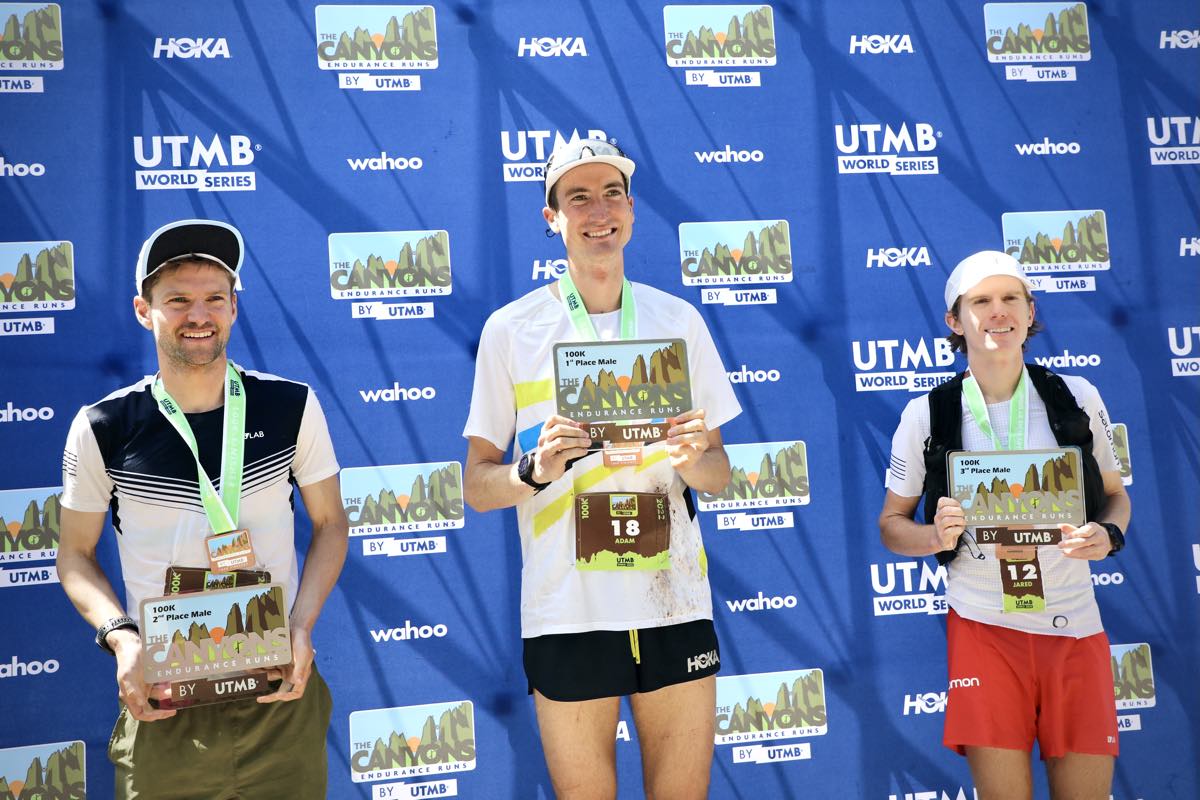
The 2022 Canyons by UTMB 100k men’s podium (l-to-r): 2. David Sinclair, 1. Adam Peterman, and 3. Jared Hazen. Photo: iRunFar/Meghan Hicks
Despite having just run his first 100k, he decided to roll the dice and avail of the Golden Ticket, and take on his first 100 miler in a little over two months’ time. He reasoned the decision to iRunFar’s Bryon Powell, in an interview pre-2022 Western States 100, saying, “I don’t feel like I always need to just make logical steps because we’re running 100 miles, that’s an illogical game.”
Despite his lack of experience at the distance, Peterman went into the Western States 100 as one of the favorites for the win. Also, having just broken the Canyons course record on his first attempt at the distance, speculation was rife about whether he’d be aiming to do the same at the Western States 100. But it wasn’t an idea he ever really entertained:
“Running the course record wasn’t really something that I had thought about. I have a lot of respect for that course record. And I knew if I went out at course record pace there was a pretty high likelihood that I would just implode. I did look at [Jim Walmsley’s] splits, but I didn’t write them down. I figured the best thing I could do would be to just run my own race.”
Peterman’s first priority was to finish, and he said, “I wanted to have the experience of running 100 miles.” He added, “I didn’t expect to win, but I thought with my training that if I could finish, I could be top five. But you never really know in ultrarunning what’s going to happen until it does.”
He stuck to the plan and ran at an intensity much lower than he was accustomed to in shorter races and said, “I didn’t really treat it as a race until around mile 40 or 45. Now when I think about it, I think I could have run it faster, and I’d like to try that next time I run it, but I think my plan of going out conservatively really worked.”
Peterman didn’t take the lead until after mile 70 of the race, but utterly dominated the final quarter, finishing in 15:13 — 34 minutes clear of Hayden Hawks in second.
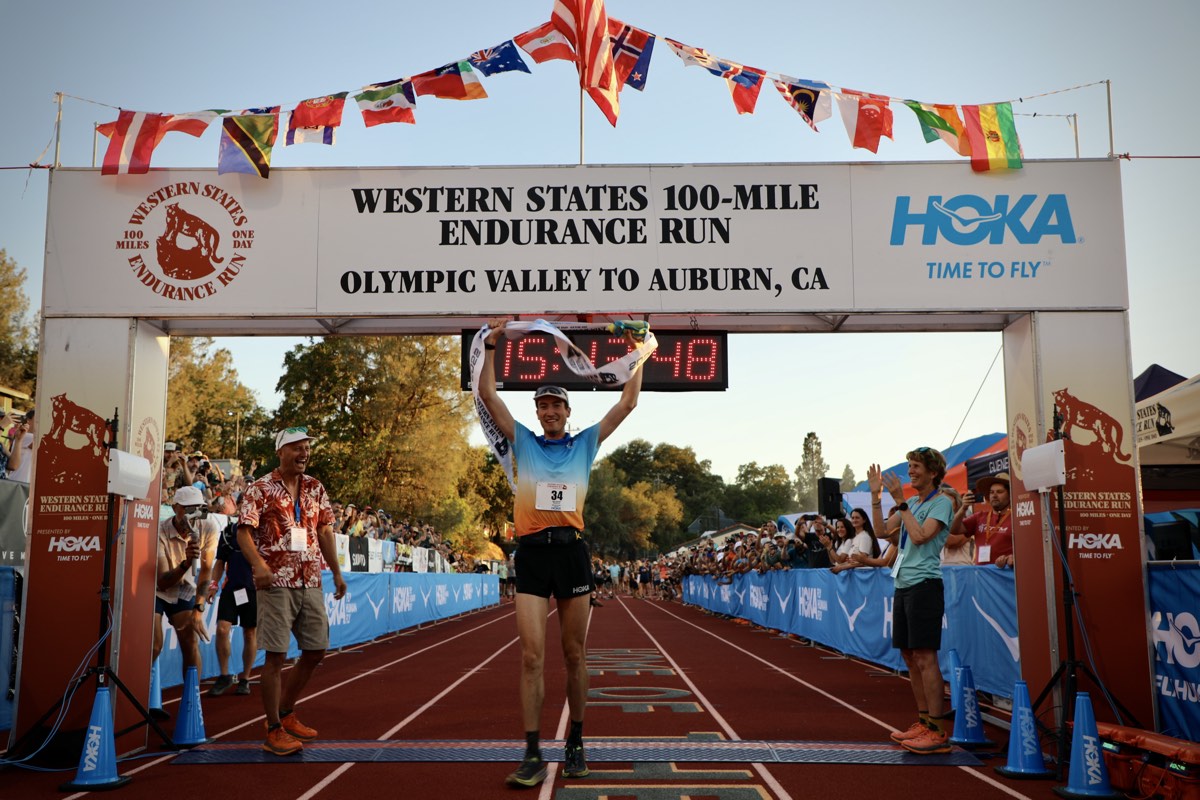
Adam Peterman wins the 2022 Western States 100 in his first effort at the 100-mile distance. Photo: iRunFar/Bryon Powell
Going Forward
Next up, Peterman joins a strong U.S. team to race the 80k distance at the inaugural World Trail and Mountain Running Championships in Thailand just next week. It will be his first time representing his country, something which he says has been a lifelong dream: “That was always a dream of mine, when I was younger, to be on team USA. I never thought it would be in trail though, I always assumed it would be the steeplechase or something. So, it’s pretty special.”
After taking some time to recover, his training in the build-up to worlds has not been drastically different to pre-Western States 100. He said, “I do about 95 to 100 miles per week, and a couple of days of cross training.”
Inspired by Kilian Jornet’s training block this summer — which was aimed at targeting both 100-mile ultramarathons and short mountain races in one season — he has also introduced some hard tempo uphill work into his training.
With an emphasis on specificity in training, almost all of Peterman’s running at present is done on the trails, but as a down-the-road goal, he hopes to qualify for the 2024 Olympic Trials Marathon.
He had originally hoped to pursue a qualifying time this autumn at the California International Marathon (CIM), but found the goal to be incompatible with recovery from his first 100 miler, saying, “If I want to run a road marathon and do it well, I think I need a little bit more time to really put in a marathon training block. So, I think I will run CIM in 2023 and then take a small break, and then continue training for the marathon in February of 2024, just to give myself three or four months of specific training.”
But he won’t be turning his back on the trails just yet. While still enjoying the downtime post-Western States 100, Peterman traveled to this year’s UTMB festival, to assist partner Erin Clark, who was running the CCC. She finished seventh in a stacked women’s field and the experience left Peterman further inspired: “I was blown away by the whole experience. I felt the same as I did crewing her at the Western States 100. I left thinking I definitely want to run the race at this point.”
He concluded our chat by answering the burning question, which I hadn’t yet asked: “My hope would be to run the Western States 100 next year, and try to do it faster, and see how close I can get to the course record. And then maybe run OCC, and maybe Sierre-Zinal before that.”
For now, all eyes are on Thailand. As U.S. teammate David Sinclair has withdrawn due to injury, Peterman will make his international debut alongside Eric LiPuma, Jeff Colt, and Adam Merry. They will face stiff opposition from Tom Evans of the U.K., Germany’s Hannes Namberger, and France’s Thibaut Garrivier — to name but a few. We can’t wait to see how it unfolds.
Call for Comments
- Have you been following Adam Peterman’s career? What are your thoughts?
- How do you think Team USA will fare at the Trail World Championships in Thailand?

